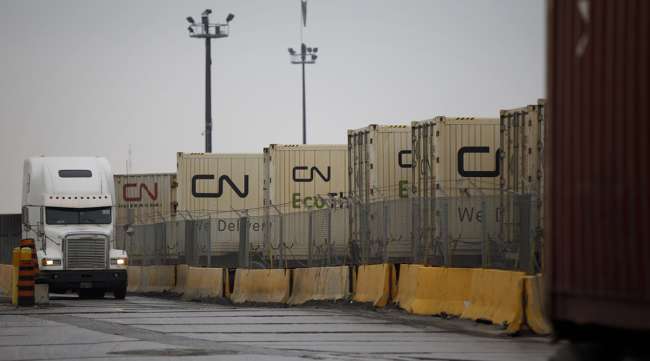Senior Reporter
Strike Ends as CN Rail, Union Reach Tentative Deal

[Stay on top of transportation news: Get TTNews in your inbox.]
Canadian National Railway and the Teamsters Canada Rail Conference announced Nov. 26 the sides reached a tentative agreement to end the strike by 3,200 CN Rail conductors and yard crews.
Workers are scheduled to begin returning to work at 6 a.m. on Nov. 27. They walked off the job Nov. 19 over a dispute concerning working conditions and benefits. Details of the tentative deal have not been made public. But it is expected the ratification process via secret ballot could take as long as eight weeks to complete. This was the first walkout in a decade at the largest railroad in Canada.

Ruest
“We want to thank our customers for their patience and support and assure them that CN is preparing to resume full rail operations as soon as possible,” CEO JJ Ruest said in a statement. “I would also like to personally thank our employees who kept the railroad moving safely at a reduced capacity. CN and its people are committed to moving the North American economy by providing freight service that enables economic growth.”
As the strike dragged on, the impact was beginning to affect the Canadian economy. Some industry groups were urging newly re-elected Prime Minister Justin Trudeau to order the railroad workers back to work, but Trudeau urged the sides to continue negotiations. The union issued a statement thanking him for respecting their right to strike.
“Previous governments routinely violated workers’ right to strike when it came to the rail industry,” Teamsters Canada President François Laporte said in a statement. “This government remained calm and focused on helping parties reach an agreement, and it worked.”
According to CN, the Montreal-based railroad carries an estimated C$250 billion in goods annually, including 180,000 barrels of oil a day in September. Before the agreement was reached, the province of Quebec said in a statement it was facing a severe shortage of propane, which is used extensively in agriculture to dry harvest grain in kilns. Farmers also use propane to heat barns to keep livestock warm. An estimated 85% of the province’s propane is shipped by rail.
As Canada’s only coast-to-coast railroad, CN handles a wide variety of products including some of the country’s biggest exports — lentils, potash, canola, field peas, flax and oats. Much of the cargo is moved by rail from the country’s sprawling agriculture sector west to the Pacific and east to the Atlantic.
The rail workers have been without a contract since July, when the previous agreement expired.
Want more news? Listen to today's daily briefing:




